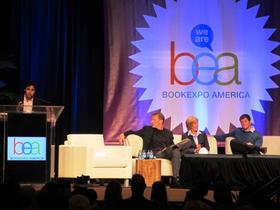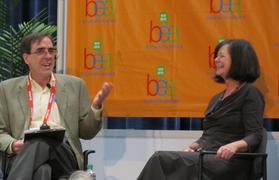"I can take any empty space and call it a bare stage. A man walks across this empty space whilst someone else is watching him, and this is all that is needed for an act of theatre to be engaged." --Peter Brook, The Empty Space: A Book About the Theatre: Deadly, Holy, Rough, Immediate

|
|
| Kunal Nayyar, Lee Child, Diana Nyad & Brandon Stanton on the big stage at BEA's Adult Book & Author Breakfast |
|
What does Brook have to do with BookExpo 2015? Good question. Ask bestselling author Lee Child, who invoked the legendary director's 1968 book during the Adult Book and Author Breakfast. Child was speaking from the very big stage in Javits Center's Special Events Hall as he recounted his early career in theater, before he moved on to TV and subsequently took his chances with the writing life.
Is BEA an "act of theatre?" Yes. Are we the audience or the performers? Both, of course. And critics as well. From my first days as a bookseller, I understood that handselling was a performance--sometimes subtle, sometimes overt, always passionate--and that the bookstore sales floor was a stage set. Ever since I attended my first ABA convention in 1993, I've seen the annual gathering as a more lavish version of what we do every day. Call it Broadway-scale handselling.
Child's conjuring of Brook's name sparked in me a more focused consideration of BEA 2015's pageantry and performances; its set designs and stars (not just bestselling authors, but actors-turned-writers like Nathan Lane and Julianne Moore). When I attend BEA, I always stay at a hotel on Broadway; I suppose that's another clue. Before the show opens, sets must be hastily constructed in the Javits Center Exhibits Hall to fill (or at least create the illusion of filling, as seemed to be the case this year) as much of that vast "empty space" as possible.

|
|
| Tea ceremony at the Chinese pavilion | |
The most ambitious stage production this year was created by Global Forum Guest of Honor China. The country's "pavilion" (an utterly inadequate word to fully describe China's dominant presence on the floor and even in the atrium) was at once massive and spare, active yet quiet. Business was being conducted, but I also watched performers demonstrate the arts of tea ceremony, calligraphy, painting techniques and more.
BEA is a massive show, but I most clearly remember its smaller theatrical moments:
On the Uptown Stage, I saw Dave Barry, Alan Zweibel and Adam Mansbach turn their "talk about our new books as fast as we can" moment into an improv stand-up act, beginning with an attempt to silence the incessant trade show din ("Hachette, keep it down!").
In the almost hidden corner where the Eastside Stage was located, Soho Press associate publisher Juliet Grimes handsold me (and others in the audience) Fuminori Nakamura's The Gun. Then Michael Reynolds, editor-in-chief at Europa Editions, handsold us the works of Massimo Carlotto, while noting that in many countries, "crime fiction is a way of getting out the truth.... Crime fiction is the real social novel of our times."
 |
|
| Ron Charles, Geraldine Brooks |
|
On the Downtown Stage, I heard author Geraldine Brooks tell the Washington Post's Ron Charles that the story of King David, which she explores in her upcoming novel The Secret Chord, is a precursor to the larger-than-life histories of Henry VIII or even fantasies like Game of Thrones because "it's all in there.... This is the fundamental story that underlies all those stories." Speaking of historical fiction, Brooks said, "This is what we do. We put ourselves in other people's lives."
As fate (and theatricality) would have it, Henry VIII made a return appearance Friday night, just after the curtain had come down on another BEA. At the Winter Garden Theatre, as I waited for the start of Wolf Hall, Part II: Bring Up the Bodies, the Royal Shakespeare Company's brilliant stage adaptation of Hilary Mantel's novels, I marveled at Christopher Oram's spare and monolithic set. New York Times theater critic Ben Brantley had eloquently described it as "a vast gray chamber transected by flame and shadow." And then, suddenly, there was King Henry, a flash of color in the almost empty space.
Now comes the point when I resist the temptation to quote Shakespeare's As You Like It ("All the world's a stage," etc.), but instead will share another connection. In 2013, I saw a Globe Theatre production of Twelfth Night. Olivia was played by Mark Rylance--who shined as Cromwell in the recent BBC/Masterpiece Theater version of Wolf Hall. It is Fabian, however, who says, "If this were played upon a stage now, I could condemn it as an improbable fiction."
There are, I confess, times when BEA feels that way to me, and yet I'll return to the stage again next year to walk across its "empty space," in search of those little moments that matter. --Robert Gray, contributing editor (column archives available at Fresh Eyes Now)

